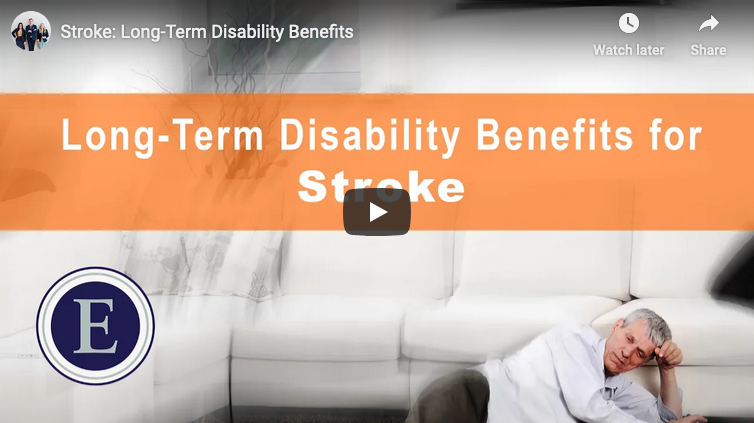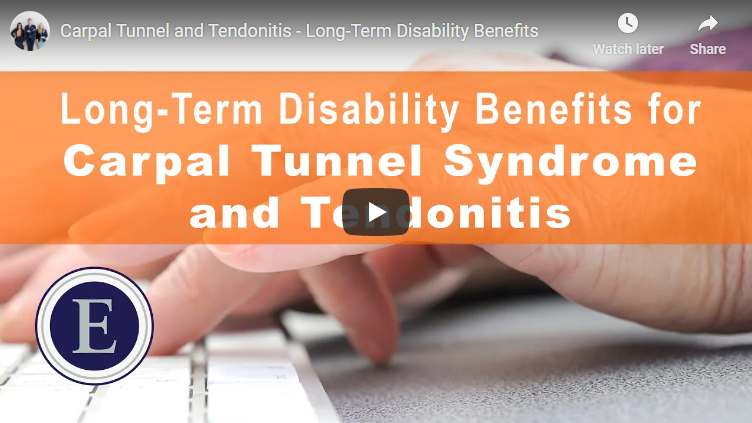Do I Qualify for Long-Term Disability Benefits if I Have Bipolar Disorder?
Can I Get Long-Term Disability Benefits for Bipolar Disorder?
One of the most common questions we get is “Do I qualify for long-term disability benefits if I have Bipolar Disorder?”
Bipolar disorder is a mental health disorder that causes a person to experience periods of extreme lows (depression) and highs (mania or hypomania), which can have a significant impact on employment and daily life.
Therefore, Parkinson’s disease can qualify for long-term disability benefits – provided it is not excluded by your insurance policy wording.
LTD Denied? Which Category Do You Fit In?
Category 1: The insurance company denied your initial claim for disability benefits for Bipolar Disorder.
Category 2: The insurance company denied your appeal.
Category 3: The insurance company discontinued or terminated your benefits.
What Can We Do For You?
We’ll work with you and your physician to help challenge the insurance company’s denial or discontinuance of your long-term disability benefits.
Where necessary, we will engage other trusted professionals to support your case including specialists, functional capacity evaluators, and vocational evaluators to help credibly explain why your disability symptoms are preventing you from doing your “own occupation” or “any occupation”.
Our Help Can Make All The Difference. How?
- Over 25 years’ combined experience getting our clients the benefits they deserve.
- Expertise in both disability and employment law (your employment status is directly linked with your disability)
- We offer a free case assessment
- We offer flexible rates, including contingency fees (i.e., only pay if you win)
- Service across all of Ontario


Bipolar Disorder: Overview
The recurrence and severity of the extreme mood swings caused by bipolar disorder vary and are individual to the person affected. While some people with bipolar disorder may experience episodes multiple times a year, others experience them far less often.
Bipolar disorder is considered a chronic or episodic disorder. Symptoms of bipolar disorder may come and go, but bipolar disorder is a life-long disability and is incurable.
Treatment of bipolar disorder is encouraged to significantly limit distress brought on by symptoms, improve productivity in work and social environments and to reduce the risk of relapse.
There are 3 main types of bipolar disorder:
- Bipolar l Disorder: Someone who is diagnosed with Bipolar l disorder experiences episodes of both depression and mania, with their manic periods lasting either 7 days or longer or requiring hospitalization.
- Bipolar ll Disorder: Someone who is diagnosed with Bipolar ll disorder experiences cycles of depression and hypomania (a milder form of mania). Bipolar ll disorder is not considered a less severe form of Bipolar l disorder but is recognized as a separate diagnosis.
- Cyclothymic Disorder: Also referred to as Cyclothymia, someone who is diagnosed with Cyclothymic disorder experiences symptoms of both depression and hypomania that are not severe enough and/or do not last long enough to be considered depressive or hypomanic episodes.
Additionally, someone may be diagnosed with another specified or unspecified bipolar disorder that does not fit under these diagnoses. Other bipolar disorders may be caused by various drugs or medical conditions.
Someone diagnosed with a form of bipolar disorder may have other disorders or conditions such as:
- Psychosis
- Anxiety Disorder
- Attention deficit hyperactivity disorder
- Drug/Alcohol abuse
- Eating disorders
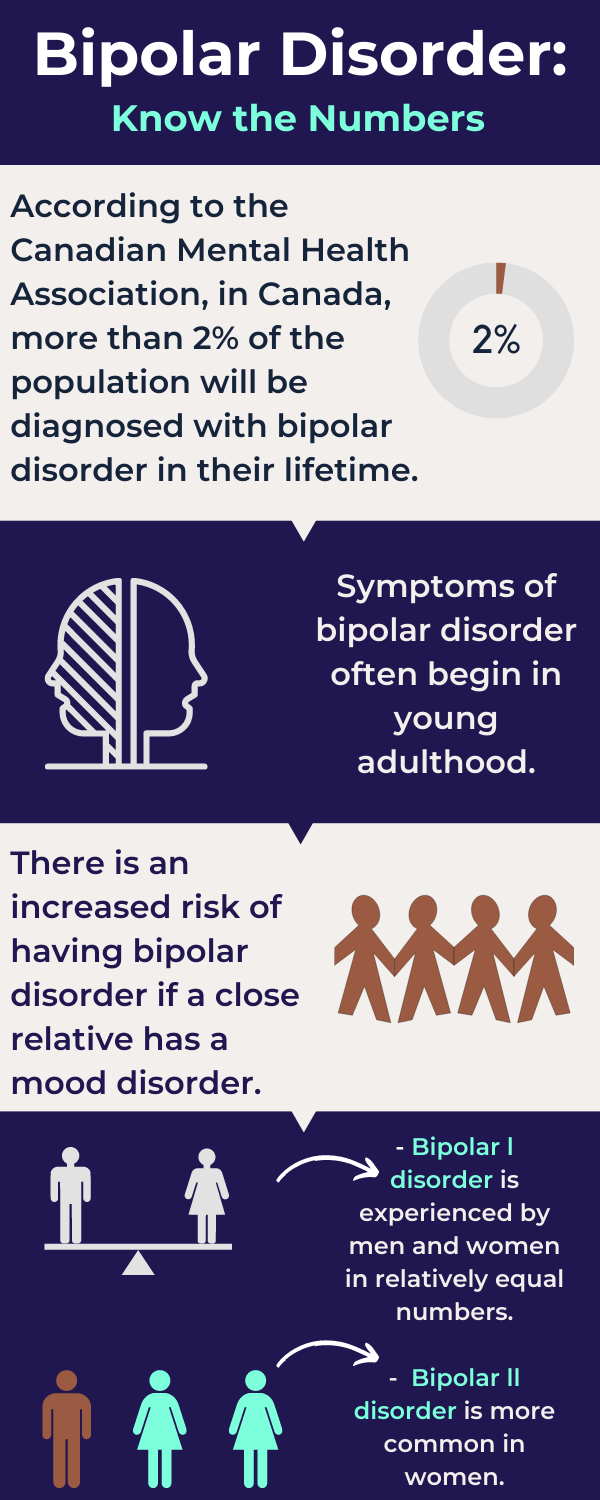
Most Common Symptoms of Bipolar Disorder
Bipolar Disorder is mainly associated with:
Mania
Symptoms of a manic episode include but are not limited to:
- Increased energy or activity
- Sense of euphoria
- Racing thoughts
- Decreased need for sleep
- Subjecting oneself to dangerous/foolish acts
- Elevated sense of self-worth
Hypomania
Symptoms of a hypomanic episode are like those of a manic episode, however, are usually less severe and do not disrupt someone’s life to the same degree.
Depression
Symptoms of a depressive episode include but are not limited to:
- Feeling extremely sad or anxious
- Lack of interest in hobbies/activities that were previously enjoyable
- Decreased concentration
- Insomnia
- Oversleeping
- Weight gain
- Thoughts of suicide or self-harm
Criteria for a Diagnosis of Bipolar Disorder
Bipolar disorder can be difficult to diagnose due to its shared symptoms with other mental health conditions.
Furthermore, those affected are more likely to seek help when experiencing a depressive episode, which often leads to misdiagnosis. Your doctor should ask you about your medical and family history as it is believed to be a genetic disorder. It is important to mention if you experience different moods if you visit your doctor during a state of depression, as common medication for depression can induce manic episodes.
Bipolar disorder is usually diagnosed with a full physical exam, medical tests to rule out other conditions and an evaluation by a specialist.
Therefore, long-term disability insurers often deny claims for bipolar disorder: its wide range of symptoms make it difficult to diagnose accurately.
Treatment for Parkinson’s Disease
Medication
The most common medication prescribed to treat bipolar disorder are mood stabilizers (e.g., Lithium, olanzapine), atypical antipsychotics (e.g., cariprazine, quetiapine) and anticonvulsants (e.g., lamotrigine, valproate sodium). Mood stabilizers are prescribed with the intent of preventing both manic and depressive episodes or reducing their severity, atypical antipsychotics to regulate imbalances within the brain’s neurocircuitry and anticonvulsants to reduce hyperactivity within the brain.
Further prescriptions targeting sleep and anxiety related issues are sometimes recommended in addition to the medications mentioned above.
Psychotherapy
Psychotherapy is usually recommended to those with bipolar disorder on top of medication. The two most effective forms of “talk therapy” for people with bipolar disorder are:
- Cognitive-behavoural therapy (CBT)- A goal-oriented approach to developing skills and strategies for creating and maintaining healthy habits. CBT sessions focus on issues prevalent in day-to-day life by identifying emotional triggers and responses.
- Interpersonal therapy – Interpersonal therapy works to improve and resolve interpersonal relationships that may be affected by one’s bipolar disorder.

Bipolar Disorder & Your Employment
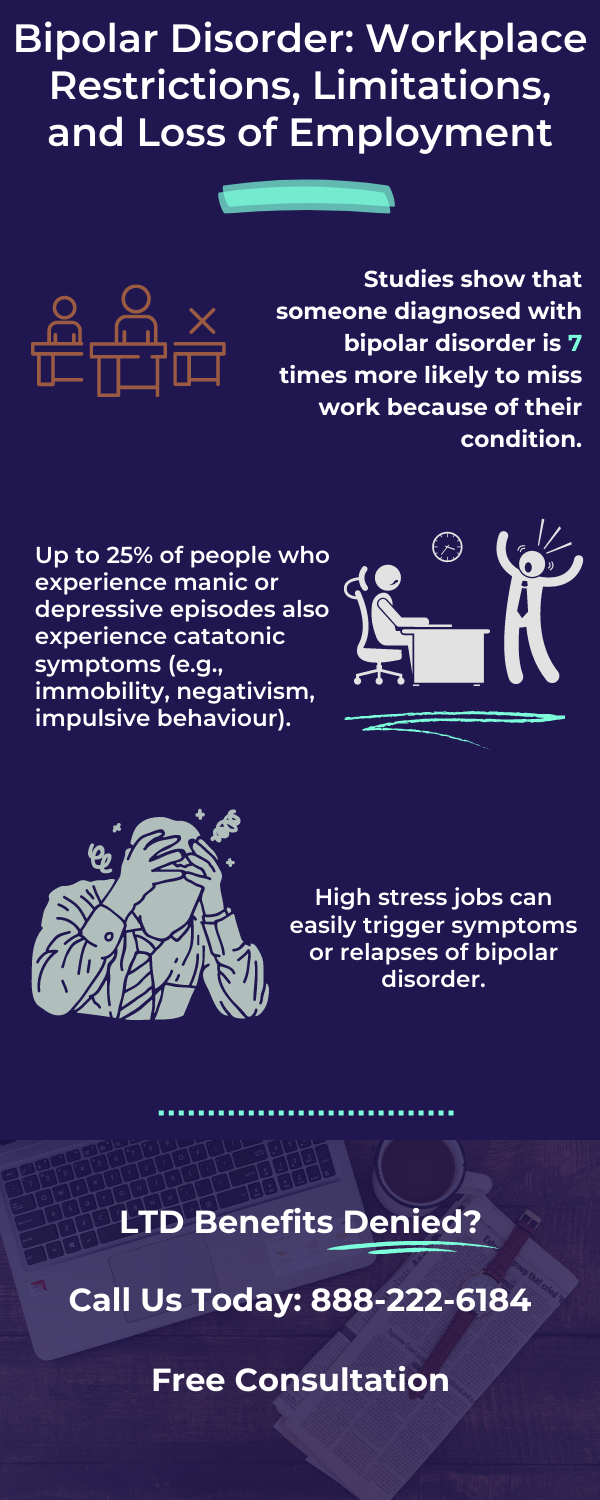
Workplace Restrictions Caused by Bipolar Disorder
When considering your employment and Bipolar Disorder diagnosis, consider how stable your condition is, how safe you are to do your job and what the demands are physically and mentally.
Bipolar Disorder and Workplace Discrimination
It is unlawful to discriminate against someone in the area of employment based on their physical disability: Ontario’s Human Rights Code and the Canadian Human Rights Act.
If you are suffering from Bipolar Disorder, you might face discrimination in a variety of ways:
- You experience employment termination because you have Bipolar Disorder.
- You are denied accommodation because of your Bipolar Disorder.
- After returning from a disability leave, your employer places you in a lower, part-time position at a lower rate of pay.
- Someone makes unwelcome remarks or jokes about your disability.
- Someone offends or humiliates you physically or verbally threatens or intimidates you because of your disability.
- Retaliating against you for filing a human rights complaint.
Ertl Lawyers are experts in Employment and Disability Law. If you have been discriminated against, our disability and employment lawyers in Toronto can help, including:
- Having your employer comply with their duty to accommodate you.
- Having your employer stop all forms of discriminatory conduct.
- Representing you in wrongful dismissal in Ontario, constructive dismissal, and human rights matters.
- Ensuring that your employer complies with its statutory obligations, including its obligations under the Employment Standards Act.
- Negotiation severance packages (including continuation of benefits).

Bipolar Disorder & Insurance Companies
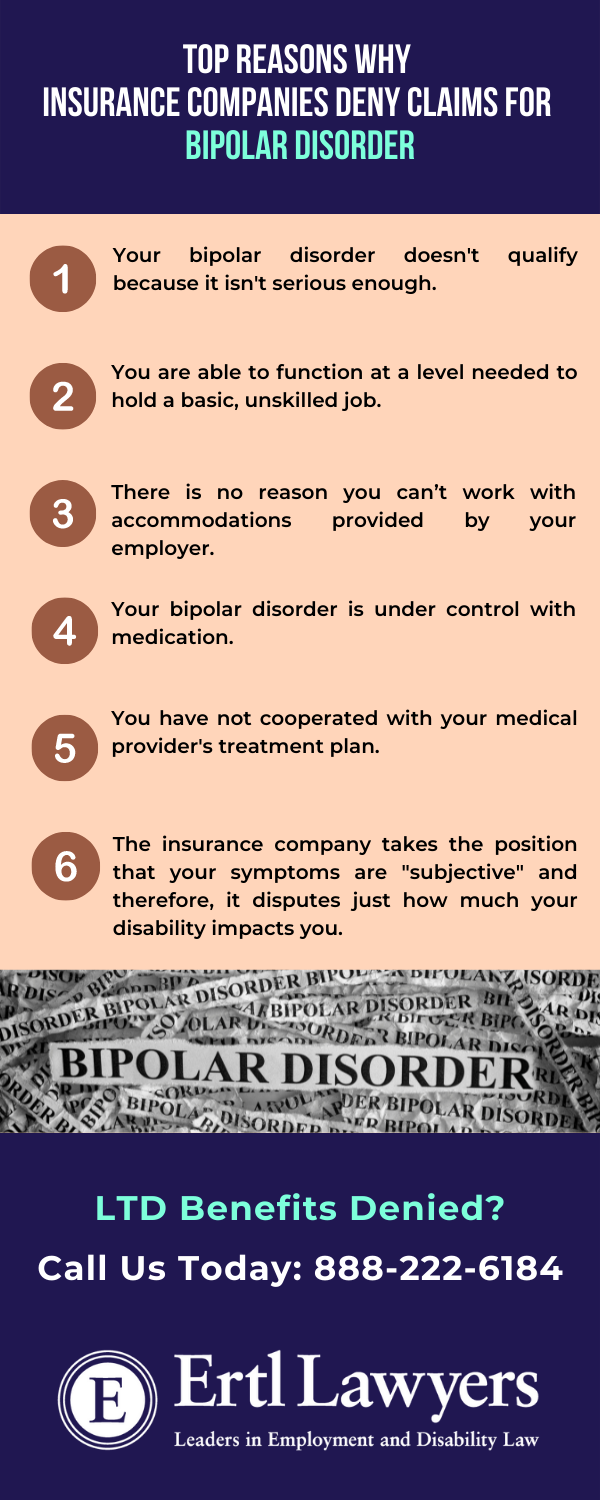
Apply for Long-Term Disability Benefits for Bipolar Disorder?
Review Your Policy Carefully
Your entitlement to long-term disability benefits for bipolar disorder depends on the specific wording of your disability policy.
Therefore, you will need to review your policy and see how it defines things like “totally disabled” and “occupation” – and whether any exclusions apply (particularly for pre-existing conditions).
Gather Medical Evidence
To be entitled to long-term disability benefits for bipolar disorder every insurer requires you to provide medical evidence documenting how your illness or injury causes restrictions or lack of ability, such that you are prevented from performing the essential duties of your occupation.
Therefore, you will need a copy of your medical records to see if there is an objective basis for your diagnosis of bipolar disorder and what your medical records say about your symptoms and your restrictions and limitations.
Gather Evidence of Workplace Limitations
Because your entitlement to long-term disability benefits for bipolar disorder depends on the strength of your evidence, you should get a copy of your employee file from work. It may show your bipolar disorder negatively impacted your work performance. Your work performance may have been affected by frequent absences from work, stress, etc.
Create a List of the Physical Duties of Your Job
You should get a copy of your job description. Based on that job description, you should write out a detailed list of the physical (and mental) duties associated with your job description – and explain how your bipolar disorder limits or prevents you from performing your own occupation.
Ask Your doctor for a Report
It is recommended that you provide your doctor with your occupational description. You should ask your doctor to prepare a report that clearly explains the objective basis for:
- Your diagnosis of bipolar disorder
- Your restrictions and limitations
- Reasons why you are unable to perform some or all of the essential duties of your own occupation.
Follow Your Doctor’s treatment Plan
Your entitlement to long-term disability benefits also requires you to be receiving regular, ongoing care and treatment for your bipolar disorder. In other words, don’t skip appointments, and always follow your doctor’s treatment plans.
Keep a Diary
On your end, it is important to keep a diary tracking your symptoms, and whether your treatment is helping.
What Other Benefits Might I Be Entitled to for Bipolar Disorder?
Other than short-term and long-term disability benefits through a group or individual insurance plan, people suffering from Bipolar Disorder might be entitled to one or more of the following benefits:
- Employment Insurance (EI) Sickness Benefits;
- Ontario Disability Support Plan (ODSP);
- Disability Tax Credit (DTC);
- Disability Creditor Insurance (under your mortgage or credit cards);
- Trillium (extended health benefits);
- Canada Pension Plan Disability (CPP-D); and
- Disability Pension (employer).
Organizations / Associations / Colleges
- International Bipolar Foundation
- Canadian Mental Health Association
- Centre for Addiction and Mental Health (CAMH)
Disclaimer: The content on this web site is provided for general information purposes only and does not constitute legal, medical, or other professional advice or an opinion of any kind. Users of this web site are advised to seek specific legal advice by contacting members of Ertl Lawyers (or their own legal counsel) regarding any specific legal issues. Ertl Lawyers does not warrant or guarantee the quality, accuracy or completeness of any information on this web site
Sources:
https://www.mayoclinic.org/diseases-conditions/bipolar-disorder/symptoms-causes/syc-20355955
https://www.camh.ca/en/health-info/mental-illness-and-addiction-index/bipolar-disorder
Long-Term Disability Benefits Denied?
Ertl Lawyers provides expert representation in long-term disability matters.
The vast majority of disability matters are resolved through negotiation and mediation – and that’s because insurance companies know that we are passionate about our clients’ rights.
How we can help you:
• free disability policy analysis
• free case assessment
• applying for disability benefits
• appealing a denial or termination of your benefits
• disputing a denial through a legal claim
• handling all communications with your employer
• protecting your employment
• prosecuting human rights claims
Fair, Flexible Rates – Including Contingency Fees
(Don’t Pay Unless You Win)
Our Help Can Make All The Difference.
Related Blogs
Understanding the Importance of Medical Evidence for Disability Claims
Claims for long-term disability benefits are routinely denied by insurance companies. They deny them for any number of different reasons, but the most common is that there isn’t enough medical evidence to support the claim that your condition is preventing you from...
Why Long-Term Disability Claims Get Denied by Insurance Companies
Injuries and illnesses happen to everyone. But what if someone is severely injured in an accident that requires months of full-time medical care or develops a condition so overwhelming that they can no longer perform routine tasks? Many employer and self-provided...
Mental Health Disability Claims: A Guide to Mental Health & Disability in Ontario
We've come a long way in our understanding and attitudes towards mental health issues, specifically in the workplace. Governments at both the federal and provincial levels emphasize the importance of awareness around mental wellness and the impact of the workplace on...




